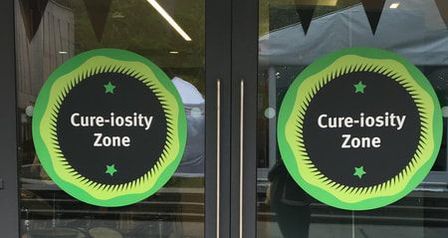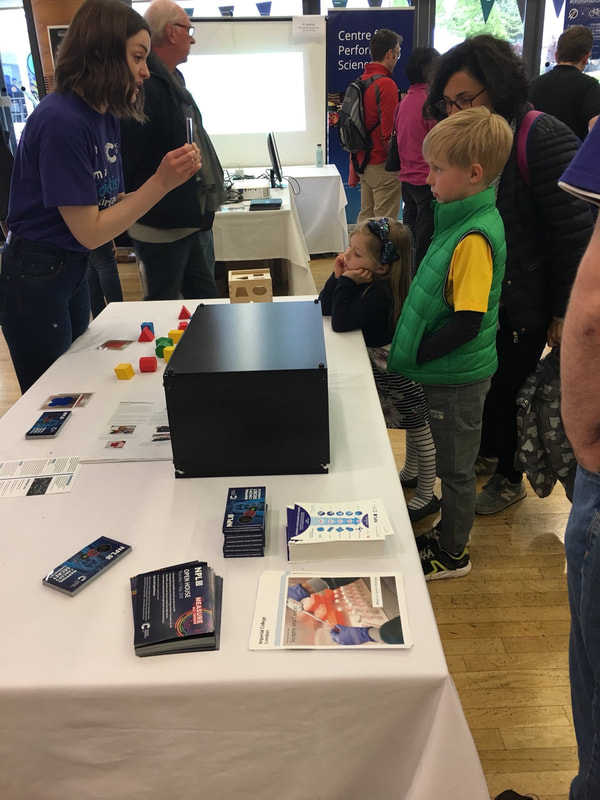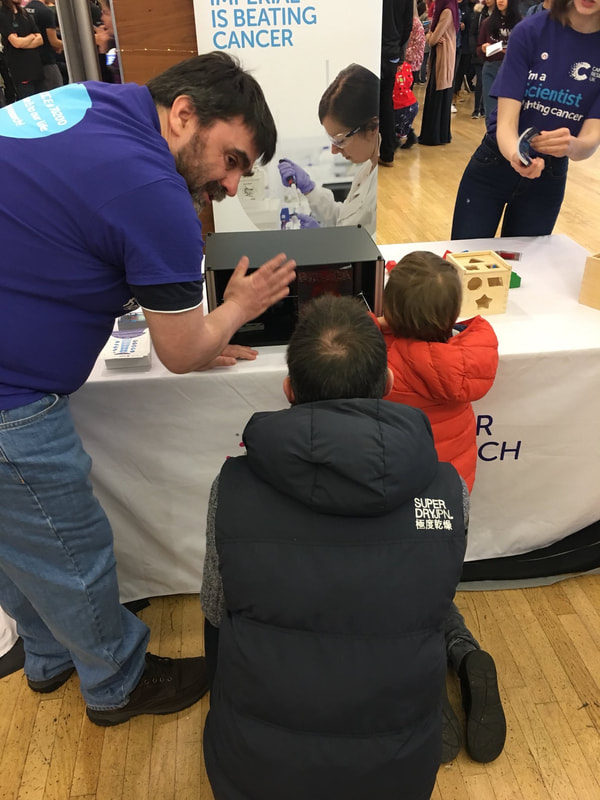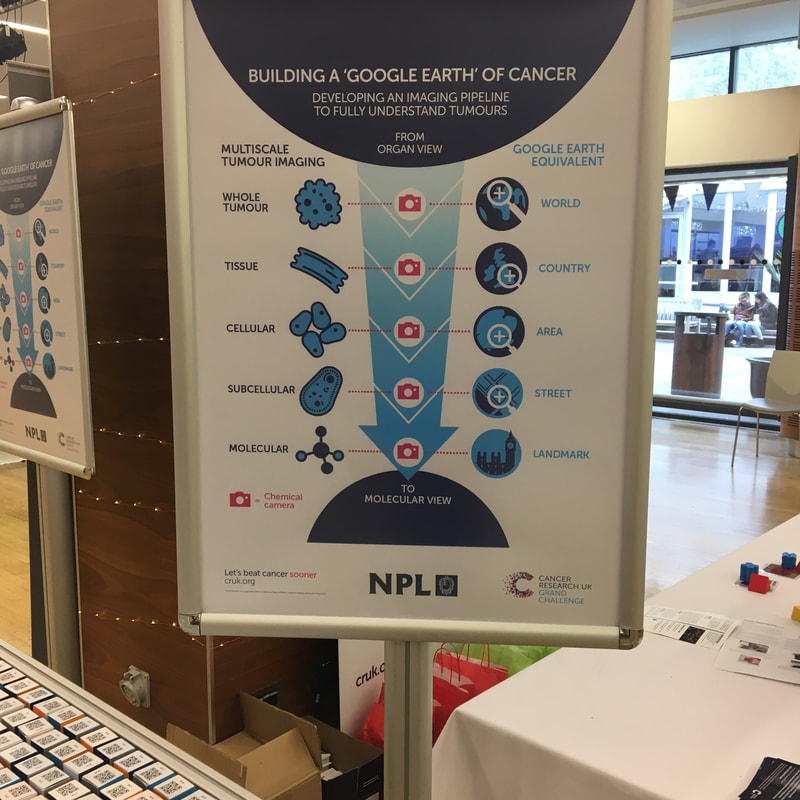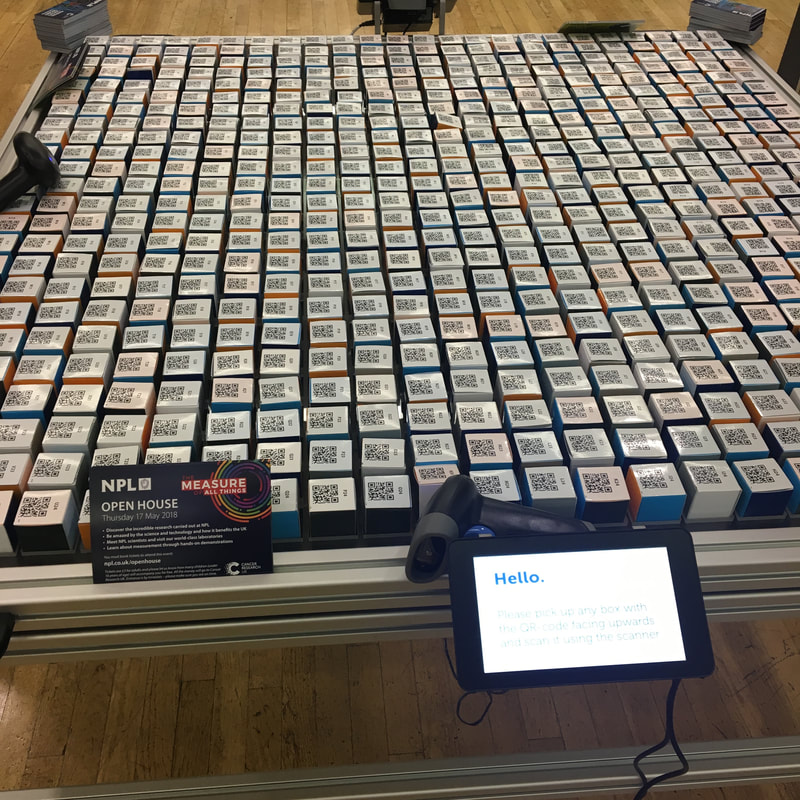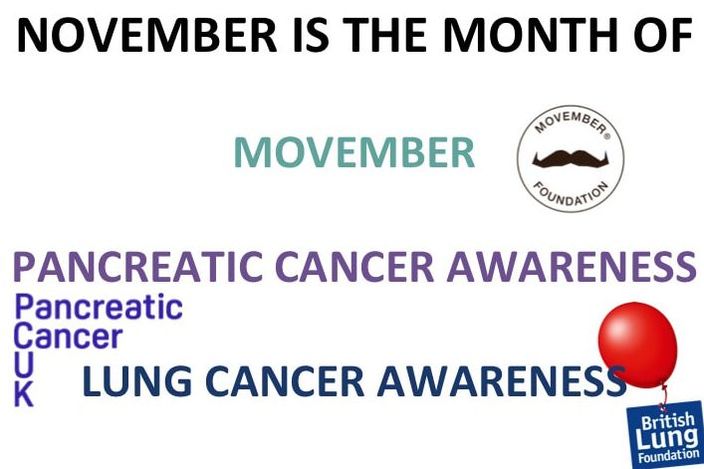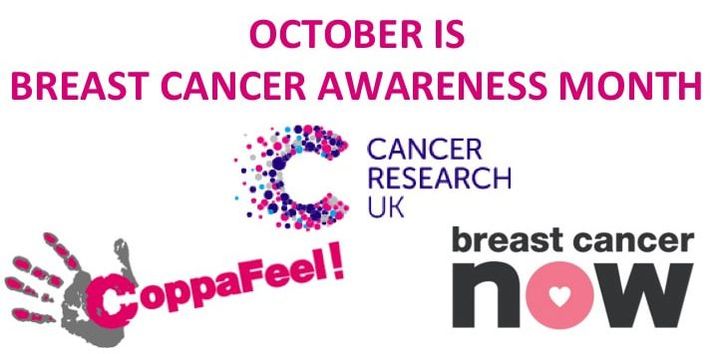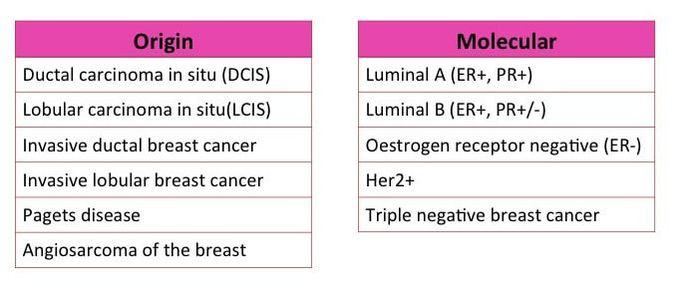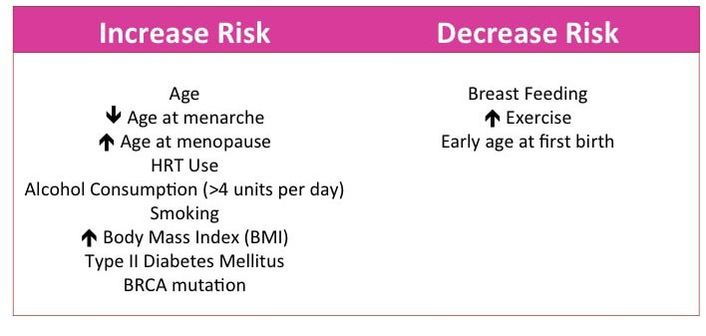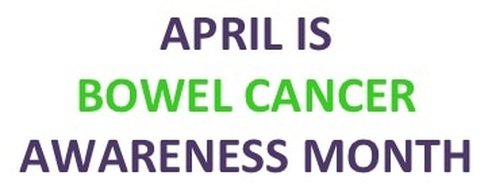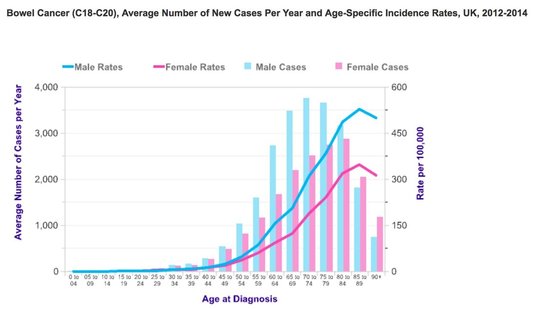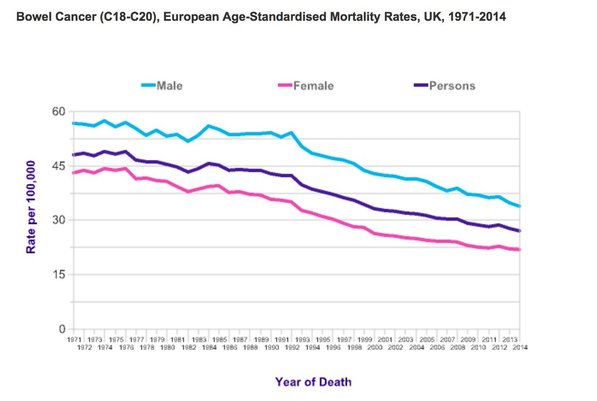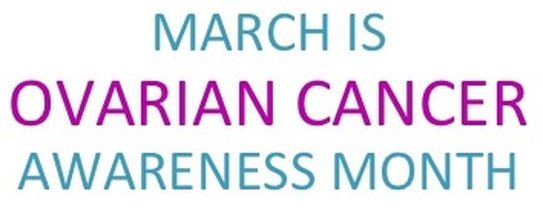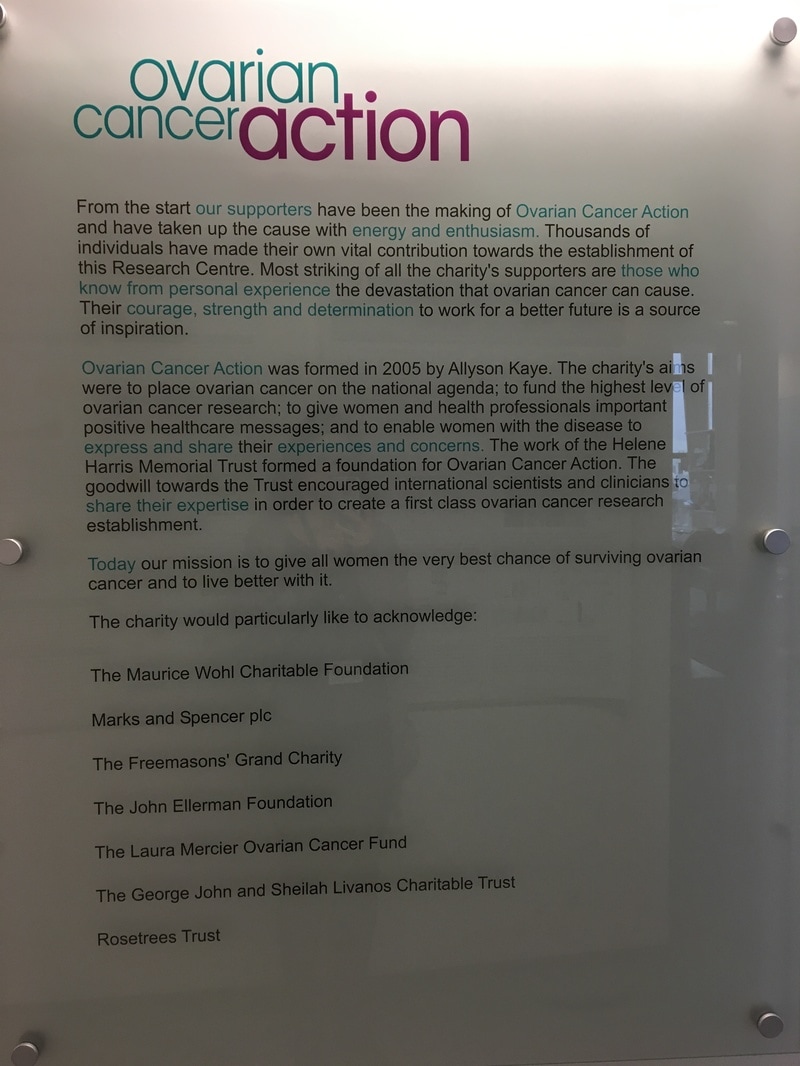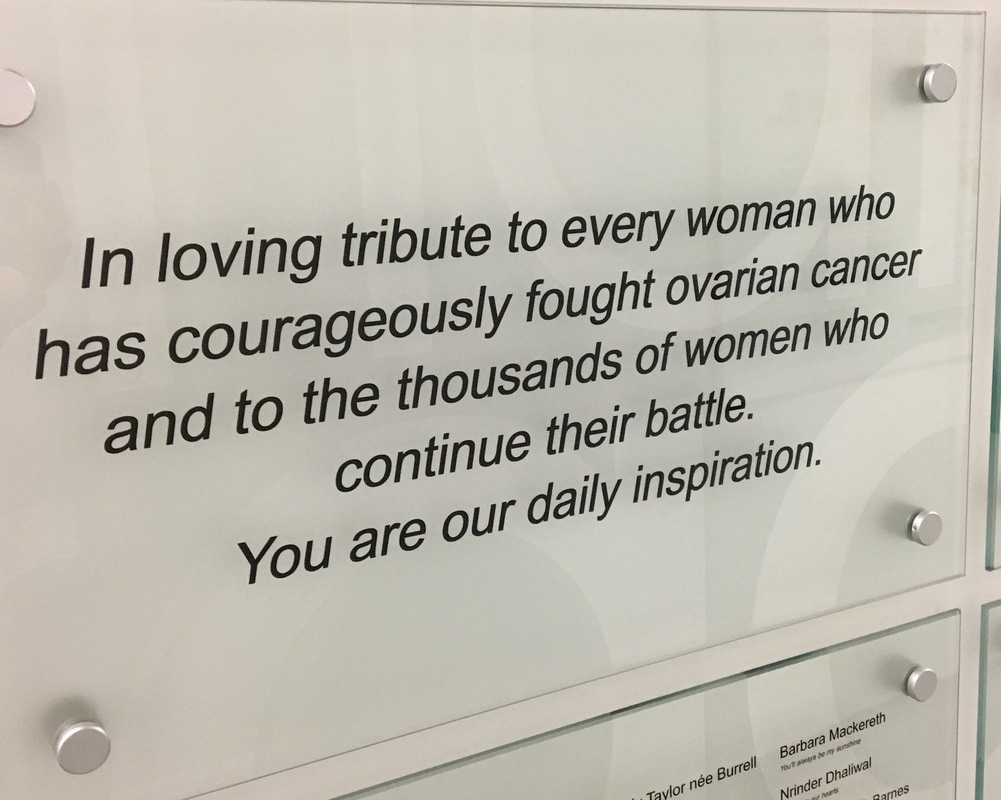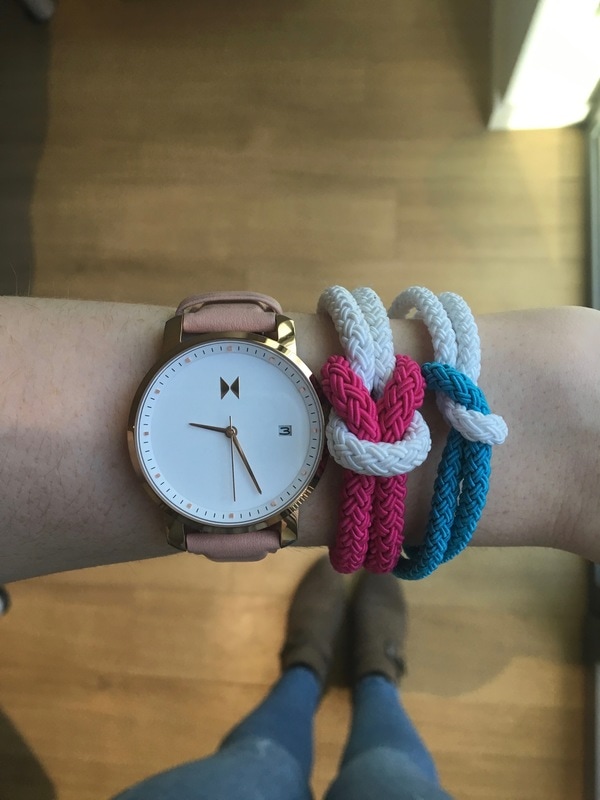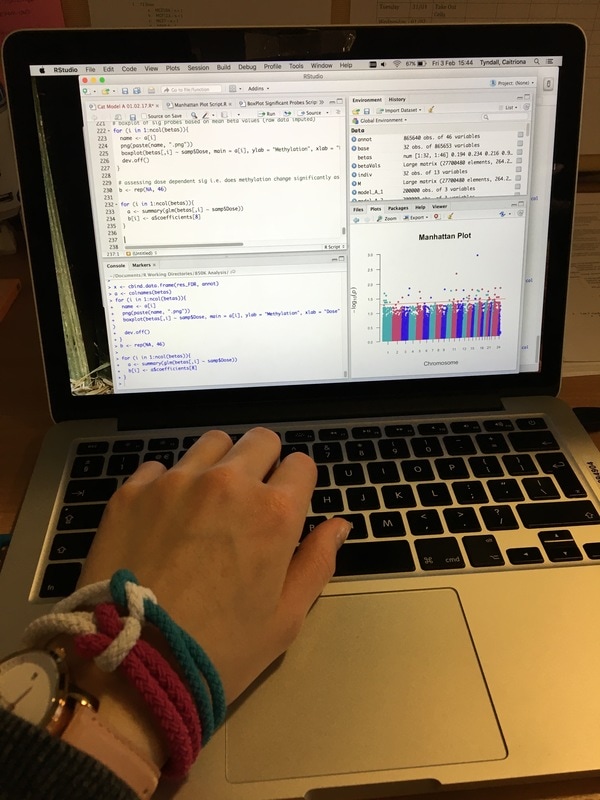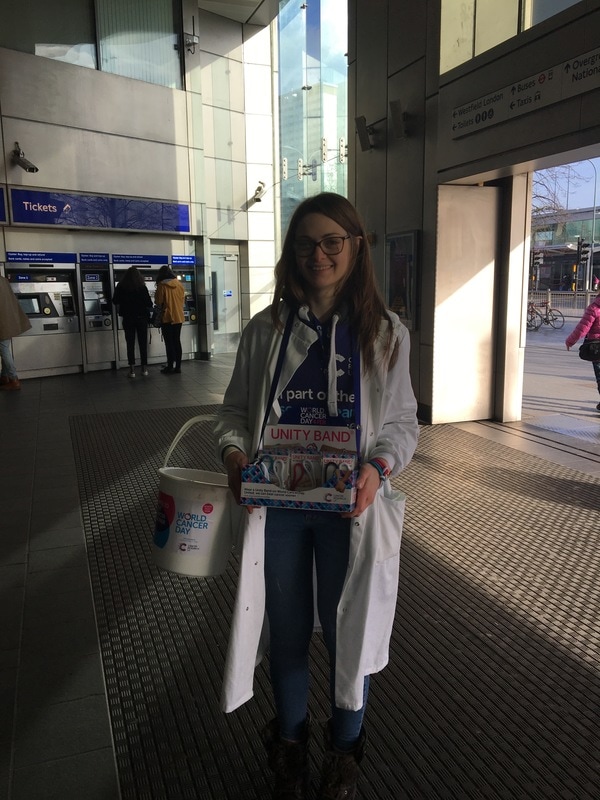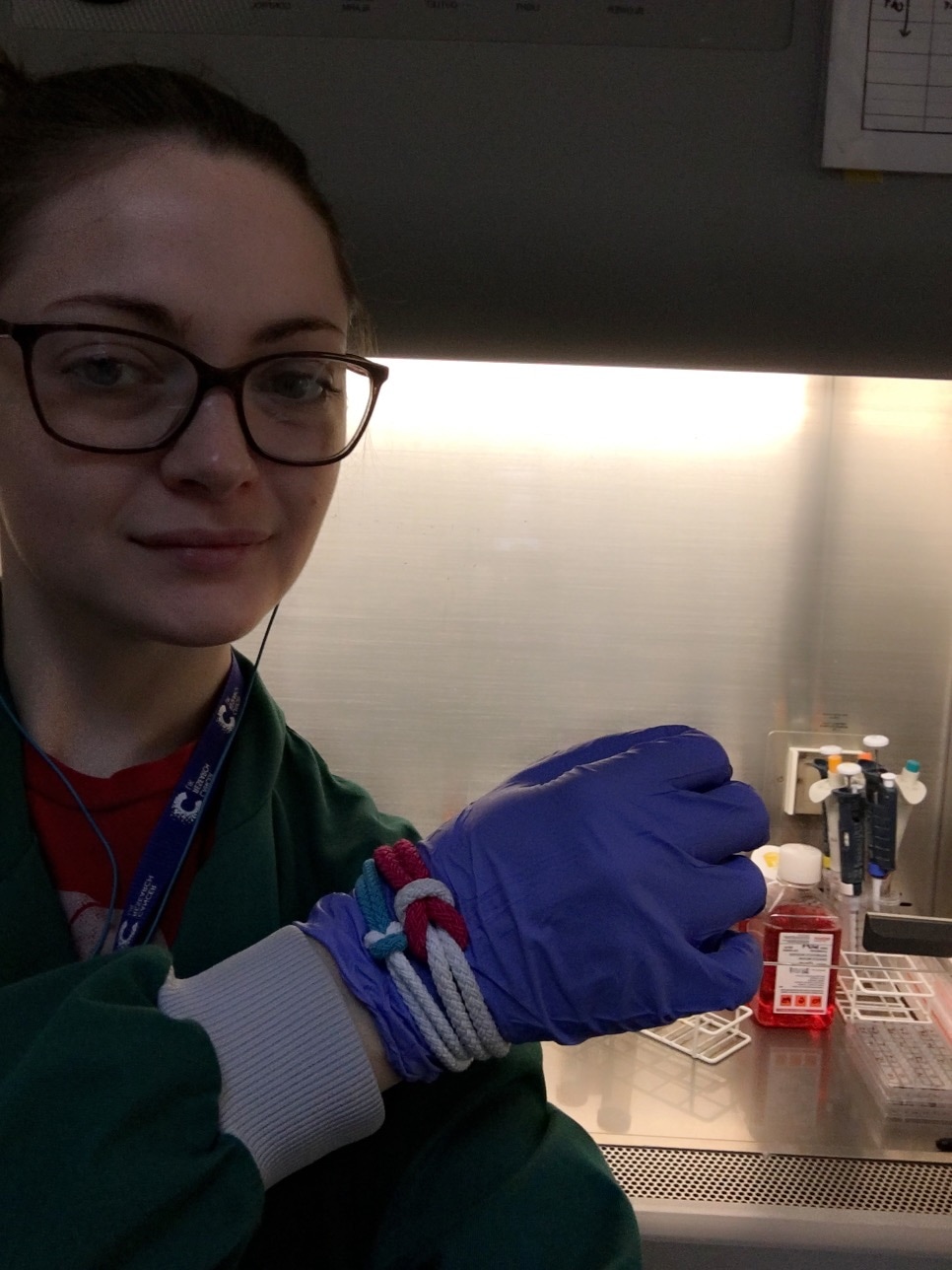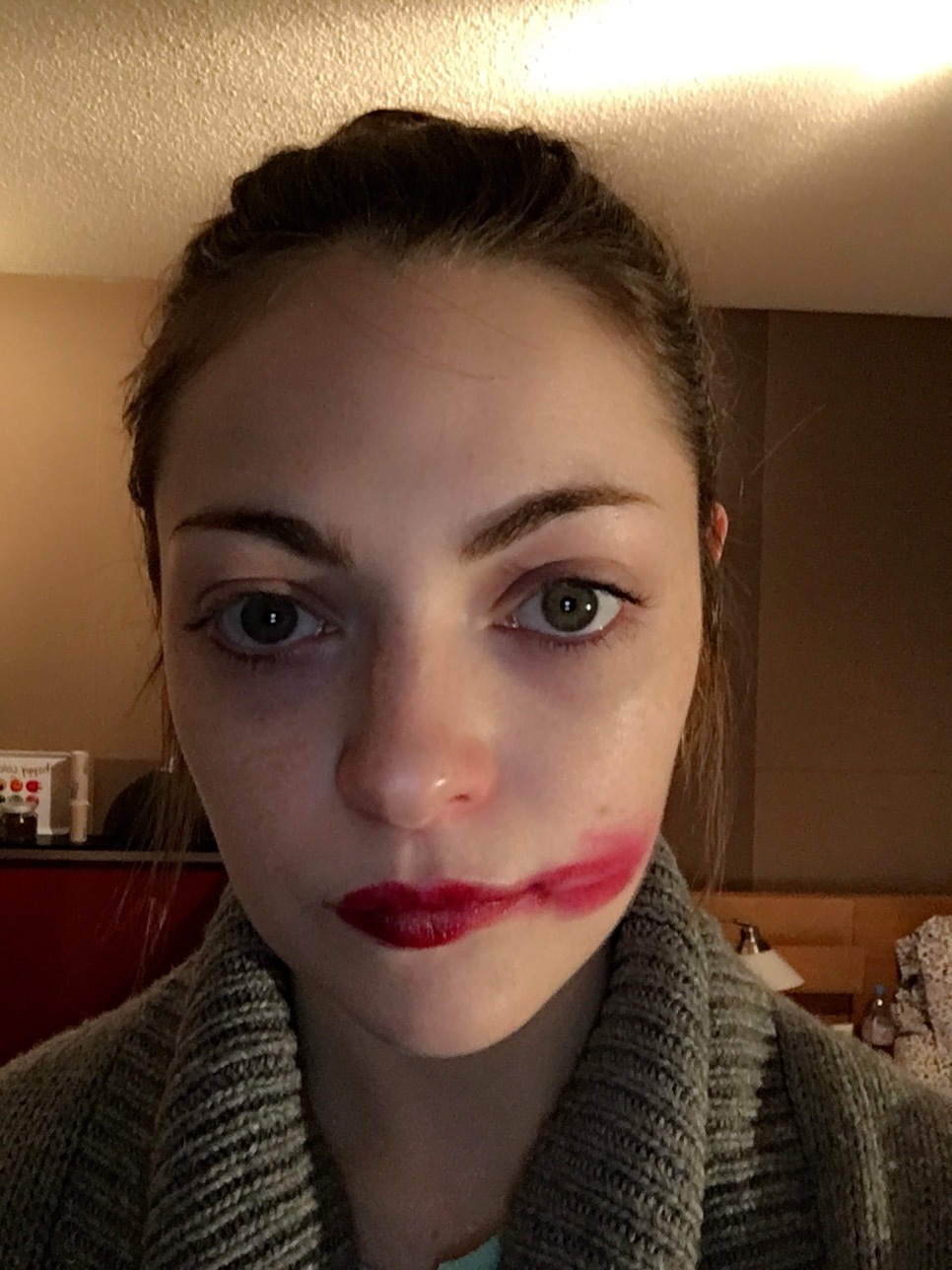|
This year at the Imperial Festival, CRUK wanted to focus on multi-disciplinary research
The second demo was looking at the work the National Physics Laboratory (NPL) are doing on building the "Google Maps of Cancer". The NPL were CRUK Grand Challenge winners giving funding to expand this idea.
The idea is to bring together all the information we have about cancer to go from the whole tumour down to the molecular level. We can use techniques such as Mass Spectrometry to gather information about cancer for example different metabolites produced by cancer compared to normal cells. The demo ask participants to scan the QC code on the blocks. This led to a neat short video about how mass spectrometry worked. At the end you go a result (i.e. the colour the block should be). You turn over the block and leave it. At the end of the day there should be an image from all the blocks turned over. For more information: http://www.npl.co.uk/grandchallenge/
0 Comments
November is a month of awareness for a few cancers. I will discuss each briefly but you can find more detail in the links given below.
I'm going to start with the worst here, pancreatic cancer. Pancreatic Cancer: Pancreatic cancer is the 11th most common cancer in the UK accounting for about 10,000 cases each year. The incidence has been steadily increasing over the last 10 years, more so in women than in men. It only accounts for about 5% of cancer-related deaths each year but here's the kicker...less than 1% of pancreatic patients will survive 10 years or more. The five-year survival rate? 3%. And finally only 20% of patients will survive their first year. That is a loss on average of around 8,000 lives a year just down to one cancer type. So why is this cancer type so bad. There are a number of reasons, the first being your pancreas is pretty important for your survival. Your pancreas does two vital things, it produces enzymes which help you digest your food and it produces hormones to regulate your blood glucose levels. Hormones like insulin. The second reason pancreatic cancer is so hard to treat is its location. Your pancreas is embedded deep in your abdomen between your stomach and your spine. The third reason is your pancreas doesn't regenerate and it's very difficult to replace with a donor. And finally and possibly most importantly for cancer treatment, pancreatic cancer usually presents at a very late stage meaning very little can be done. Symptoms: Again with a lot of cancers the symptoms are vague and can include:
Type of pancreatic cancer:
Diagnosis and treatment: Diagnosis of pancreatic cancer is mainly through examination of the pancreas using an ultrasound or CT scan accompanied by blood tests and a biopsy. The majority of patients are diagnosed at stage IV, which is why the survival rate is so low. The treatments for pancreatic cancer are the standard: surgery, chemotherapy and/or radiotherapy. Unfortunately lack of response to treatment and recurrence is high. There are many ongoing clinical trails to find new targeted therapies for pancreatic cancer. Screening and prevention: Currently there are no screening programmes for pancreatic cancer and early diagnostic tools like CA19-9 are unreliable as a proportion of pancreatic cancers don't release this marker. This is a terrible disease with a shocking survival rate and it is only getting worse. Pancreatic cancer research is one of the most underfunded research areas today. But with more awareness hopefully charities like Pancreatic Cancer UK can raise more funds for vital research.
To keep with the theme of vastly underfunded research areas I will next talk about
Lung Cancer: You would expect through all the campaigns about quitting smoking etc. that lung cancer would be one of the most funded cancer research areas but it is sadly not. Lung cancer is the third most commonly diagnosed cancer in the UK accounting for about 46,000 new cases a year. But just like pancreatic cancer, the 10-year survival rate is only 5%. The sad thing is CRUK estimates about 89% of lung cancer cases could be prevented. I won't lie to you we all know the biggest risk factor for lung cancer is smoking. We've seen the ads and the photos on cigarette packets. The statistic here to remember is that while only 10% of smokers will get lung cancer a whopping 86% of lung cancer patients are smokers, former smokers or passive smokers. Symptoms of Lung Cancer:
Types of lung cancer: The "types" of lung cancer are grouped together because of the size of cell the cancer originated in but they are not all the same cancer.
Diagnosis and treatment: Usually once you have presented with symptoms which indicate lung cancer a patient will receive a chest x-ray and/or bronchoscopy accompanied by a biopsy. It must be noted that treatment for the two cancer types are different, depending on where it is and the stage. But the standard treatments for lung cancer is standard: surgery (which could be as little as removing the tumour to as much as removing a lung), chemotherapy, radiotherapy, photodynamic therapy and ablation. There are targeted therapies available for advanced lung cancer patients which target pathways such as EGFR (erlotinib) or tyrosine kinases (genfitinib). Screening and prevention: While there is no national screening taking place for lung cancer the best way to prevent it is to quit smoking. Anti-smoking campaigns are one of the most successful awareness campaigns out there. And the big question you've been burning to ask - why is lung cancer so underfunded? Sadly I have no answer for you. The funding process is a difficult and complex system which I know very little about. The good news is that CRUK at least have pledged to put more funding into these poorly researched cancers like Lung and Pancreatic.
And finally let's talk about Movember. Now November isn't the month for awareness on testicular cancer or prostate cancer so I won't be talking about these. However it has become a month where awareness and funds are raised for all men's cancers. And awareness to me is more important that a single penny. I have spoken on this before but just to hit it home once again, prevention is better than cure. Not all cancers can be prevented I'm afraid but if we can reduce the numbers of people being diagnosed we can reduce the numbers who lose their lives.
The fact the Movember has come about is particularly important. The most funded cancer research area to date is breast cancer. And it is thought that part of the reason for this is women. Women who had/have breast cancer or women who have lost a family member or friend to breast cancer. These women are the driving force behind every awareness campaign, behind new drugs being made available to patients and behind vastly successful national screening. To me it seems women are, interestingly, the major focus of cancer awareness campaigns because they are usually the driving force behind them. I'm not going to go into gender biases about how "women talk more about their problems than men" because if cancer screening has taught me anything its not true (take a look at bowel cancer screening statistics). But what I am saying is that men as a whole (sorry to put it like that) have less opportunities to avail of screening services and may not know what they are really supposed to be looking out for. Which is why Movember is so brilliant. It encourages men to get involved and to talk about male cancers. It puts male-specific cancers in focus while allowing men to actively participate by growing beards (super manly). I like to highlight charities and companies that inspire me and to me show genius and innovative ways of raising cancer awareness and funds. And the underwear company OddBalls encompasses this completely. The company, started in 2014, designs and creates underwear (not just for men but for women as well). And with your new boxers you also receive a handy guide to checking yourself for testicular cancer. They have become so popular they now design underwear for rugby clubs including The Welsh International Team AND have set up their own charitable foundation. If you want to know more or maybe by a pair for yourself, check out: www.myoddballs.com/ They also do socks, bobble hats, rugby jerseys and more!
If you have any questions please don't hesitate to contact me.
For more information visit: www.pancreaticcancer.org.uk/ www.cancerresearchuk.org/about-cancer/pancreatic-cancer?ds_kids=p3584232188&adc=cpc&gclid=EAIaIQobChMImP__2rjG2AIVyrftCh0JBwOcEAAYAiAAEgLai_D_BwE&dclid=CMSp4ty4xtgCFVBuGwodM9sKyg www.cancerresearchuk.org/about-cancer/lung-cancer www.blf.org.uk/?gclid=EAIaIQobChMIqZy7osLG2AIVzbztCh2LnAvCEAAYASAAEgIt3fD_BwE uk.movember.com/
October is breast cancer awareness month. I want to tell you in this post some information about breast cancer symptoms, diagnosis and treatments. I have worked in various areas of breast cancer research in the last 5 years, most notably my PhD is focused on understanding diabetic drugs in order to prevent breast cancer. It's an area close to my heart.
Breast cancer is the most commonly diagnosed cancer in the UK. About 55,000 new cases are diagnosed every year and 7% of all cancer-related deaths can be attributed to breast cancer. There is some good news and bad news about breast cancer survival. The overall 5-year survival is around 86% but when you break this down by stage of the cancer type, this value falls dramatically for those with higher stage cancers. 5-year survival for women with stage IV cancer is approximately 15%. The survival rate has doubled in the last 40 years due to better preventative measures, better diagnosis and better therapies.
Breast cancer types:
I've already spoken a bit on the different cancer types and how tumours can be classed by their origin but also molecular differences ("What the Hell? - Cancer Part 2).
I've also talked before about risk factors, which are lifestyle or genetic factors that can increase or decrease the likelihood of developing a certain disease. There are a number of risk factors associated with breast cancer (some are in image 3).
Symptoms:
Most women know the symptoms of breast cancer:
Diagnosis: There are a number of ways a breast tumour is identified:
Treatment: Treatment depends on the stage/grade of your tumour, the molecular subtype and the willingness of the patient. There are the standard treatment practices (1-3) but also more personalised therapies (4-5)
Prevention: Prevention is key. You will hear my harp on about prevention is the cure to cancer but really it's one of the key areas we as individuals can look after for our own health. In fact it’s estimated that about 27% of all breast cancers could be prevented and there are a number of prevention techniques you can adopt
All rights to this video belong to Coppafeel!.org
And let's not forget the men here! Men can suffer with breast cancer. While only about 400 men are diagnosed each year that is still a significant number. Male breast cancer is quite similar to female breast cancer in terms of risks (though an additional risk factor is Klinefelter's syndrome), diagnosis, symptoms and treatments.
Finally I would like to talk to you about a charity which inspires me to keep doing the work I do. This charity was set up by a young woman who was diagnosed with breast cancer in her early 20's. Instead of wallowing in her diagnosis of metastatic breast cancer she decided to set up a charity to better educate young women to CHECK YOUR BREASTS! That charity was set up over 8 years ago and despite multiple metastatic tumours Kris is still alive and more vibrant than ever. This charity is called Coppafeel! (a genius name). If you have time please check out their website https://coppafeel.org/ and check out Kris's story (https://coppafeel.org/our-charity/kris-story/). A truly inspirational woman backed by the most incredible fundraisers and supporters. I haven't had the chance to work with coppafeel but it is one of the charities I would most like to get involved in.
For more information on any of the areas I've discussed visit:
about-cancer.cancerresearchuk.org/about-cancer/breast-cancer www.breastcancernow.org
May is an interesting month in cancer awareness. Depending on the country you live it you are bringing awareness to Bladder Cancer, Brain Tumours or Skin Cancer/Sun Awareness. So to be fair I will do a little about all these cancers!
Bladder Cancer:
Bladder cancer is the 10th most common cancer diagnosed in the UK. Bladder cancer effects both men and women is more common in men compared women. Approximately 10,000 new patients are diagnosed every year and only 50% of those patients will survive 10-years or more. More than 50% of bladder cancer cases are diagnosed in patients 75+ years old. Over the last 20 years bladder cancer incidence has decreased by 38% with better diagnosis and treatments. As with most cancers, 42% of bladder cancer cases are preventable. There are two main symptoms of bladder cancer:
Read more at: http://www.cancerresearchuk.org/about-cancer/bladder-cancer
Brain Cancer:
Brain cancer (including other central nervous system and intracranial tumours) is the 9th most commonly diagnosed cancer in UK and effects both men and women. There are approximately 10,000 cases diagnosed every year however only 14% of those patients survive 10 years or more. Cancer is a disease commonly associated with ageing (older people are more likely to be diagnosed with cancer), however brain tumours effect people of all ages. As complicated as the brain is, the symptoms of brain cancer are numerous and equally complicated. For more detailed symptoms and information please visit CRUK's website: http://www.cancerresearchuk.org/about-cancer/brain-tumours/symptoms. Brain cancer is diagnosed using MRI, CT or blood tests. Brain cancer is one of the most difficult cancers to diagnose and treat. The brain is incredibly delicate and any damage could lead to long term problems. Usually when a cancer patient undergoes surgery, the surgeon tries to take a little of the "normal" tissue around the tumour. This area where tumour and normal tissue meet is called the "leading edge". This gives the surgeon more confidence that all of the tumour has been removed. But every single cell in brain in important. You cannot take big chunks of the brain out so surgeons must remove right on the leading edge. This sadly occasionally means some tumour gets left. Recurrence of the tumour is a lot higher in brain tumours compared to other cancers. Another issue with brain cancer is chemotherapy and radiotherapy. Chemotherapy does damage to normal cells, so giving a lot of chemotherapy directly to the brain is dangerous. Similarly radiotherapy can cause damage. They are incredibly difficult to treat and I have to commend all the brain cancer surgeons, doctors, nurses and care givers for their work. The positive it that there is a lot of research going into killing brain cancer cells without damaging the brain. One example is CRUK who have set up a funding initiative focusing on cancers with unmet needs, including brain cancer. So out there right now are researchers working on understanding, diagnosing and treating brain cancer. Read more at: http://www.cancerresearchuk.org/about-cancer/brain-tumours
Skin Cancer:
Skin cancer is the 5th most commonly diagnosed cancer in the UK with approximately 15,000 patients diagnosed every year. The positive - 90% of patients survive 10-years or more and about 80% of skin cancers can be prevented. The majority of skin cancer is diagnosed in patients 60+ years. The common symptoms for skin cancer are:
Here comes the sun awareness! There are two main UV radiation wavelengths that come from the sun and get through our atmosphere. The one most closely linked to cancer is UVA. UVA penetrates deep into your skin. When the UVA light goes into your skin cells it causes DNA damage. If the DNA damage persists through cell division (read: What the Hell? The Cell for more info) this causes cell instability and can lead to cancer. UVB tends to only penetrate the top layers of your skin, causing sunburn. To date there is no conclusive evidence linking UVB radiation to cancer. UVB actually stimulates your skin cells to produce vitamin D. But with one comes the other! And it doesn't matter if it is sunny or bucketing down, UV light still reaches your skin. While it is recommended that you spend some time outside every day, you need to take care of your skin with UVA protection. Your sun protection should have SPF AND UVA protection to be the most effective. Sun protection should be applied regularly. Wear a hat, avoid direct sunlight. If you don't believe me, ask Hugh Jackman! Read more at: http://www.cancerresearchuk.org/about-cancer/skin-cancer
April is Bowel Cancer Awareness Month.
Bowel cancer is the 4th most commonly diagnosed cancer is the UK. Over 40,000 new cases are diagnosed every year but only 57% of these patients will survive more than 10 years. About 94% of patients diagnosed with bowel cancer are 50+ years old. It is a disease that effects both men and women. While the number of people diagnosed with bowel cancer has not changed in the last 20 years, the number of patients losing their lives to this disease has started to fall. This is due to better understanding of risk factors, better screening and better treatments.
What is Bowel Cancer?
Bowel cancer is a disease that effects the "large bowel" which is made up of the colon and the rectum. This is why bowel cancer is commonly known as colorectal cancer. Bowel Cancer UK have a great interactive map on their website to explain what the large bowel is and how it works (https://www.bowelcanceruk.org.uk/about-bowel-cancer/the-bowel/). There are a number of symptoms for bowel cancer including:
Experiencing any of these symptoms over a prolonged period of time could be a sign of bowel cancer. However, if you are bleeding unexpectedly from anywhere I would definitely see a doctor straight away. How is Bowel Cancer Diagnosed? If bowel cancer is suspected, the patient can undergo a number of exploratory tests such as colonoscopy. This allows a doctor to see inside your large bowel and identify any areas of trauma or if there are polyps present. Polyps are small growths in the lining of your bowel. They can be benign (no disease) or malignant (disease). If a doctor sees polyps he will take a sample (called a biopsy) for further testing. This biopsy is used to determine if there is cancer present and what stage the cancer is. How is Bowel Cancer Treated? The most common treatments for bowel cancer are surgery, chemotherapy and radiotherapy. There are also more targeted therapies available for bowel cancer.
Bowel Cancer Screening: Approximately 50% of bowel cancers can be prevented. With improved screening techniques, patients can be diagnosed earlier. In the UK there is screening programme in people aged 50 - 75 years. It is called the FOBT (Fecal Occult Blood Test). This test detects small amounts of blood in your stool. It is an "at home" test which you can do yourself three times over a two week period and send to a screening centre. If there is no blood detected you are ask to repeat the procedure in 2years time. If there is blood detected you are brought in for further tests. If no cancer is detected, the patient is placed on an observation programme to ensure the patient doesn't get cancer. If there is cancer detected, the patient in given further treatment. The FOBT test is slowly being replaced with a more reliable test called FIT (Fecal Immunochemical Test). This test detects the same thing as FOBT but there are far less false positives (blood when there isn't blood) and it is only done once, not three times over a two week period. If you have been sent one of these kits, please make sure you do the test. I now it's a bit gross but it could save your life. All the information for this post was provided by: https://www.bowelcanceruk.org.uk/ http://www.cancerresearchuk.org/about-cancer/bowel-cancer
March is Ovarian cancer awareness Month.
Ovarian cancer is the 6th most common gynaecological malignancy in the UK. Over 7,000 cases are diagnosed yearly but only 35% of those women survive for 10 years or more. This is because ovarian cancer is usually diagnosed late, when patients are in stage III and IV of cancer. This makes treatment difficult, recurrence common and resistance to drugs frequent. There are four symptoms for ovarian cancer:
Experiencing these symptoms regularly over a prolonged period could be a sign of ovarian cancer. You may notice these symptoms are not very specific to ovarian cancer and typical "Oh it will clear up on it's own" symptoms people usually don't go to the doctor for. If you or someone you know experiences these symptoms you should chat to your doctor about them. You may feel a little foolish and it may be nothing but it's worth a little bit of piece of mind. The highest incidence of ovarian cancer is in older women (70+) but as we all know cancer can effect you regardless of age. Another indicator of ovarian cancer is CA-125. CA-125 is a protein coded by the gene MUC16. It is produced by epithelial cells in the female reproductive tract. In some ovarian cancers, CA-125 is over expressed and released into the blood. There it can be detected. high levels of CA-125 are associated with ovarian cancer diagnosis. This is known as a biomarker (i.e. a molecule that can be detected which indicates cancer). However this is not 100% cancer specific. Other disease in the ovaries/uterus can lead to the release of CA-125. Further diagnostic tests such as ultrasound and/or CT scan are needed. There is a heritable genetic element to ovarian cancer. Some of you might recognise BRCA as a key mutation in breast cancer (most notably Angelina Jolie had a prophylactic double mastectomy). BRCA mutations are also associated with increased ovarian cancer risk. It is important for BRCA carriers to not only be monitored for breast cancer but also ovarian cancer. Depending on your stage, the most common treatments for ovarian cancer are surgery and chemotherapy. Occasionally women will receive chemotherapy before surgery (known as neoadjuvant chemotherapy). Radiotherapy is also a treatment option. Unlike other cancers where there are more targeted therapies available (for example tamoxifen for ER+ breast cancer) to date the only targeted therapies for ovarian cancer are in clinical trial stages. This reduces the options for women who develop resistance to primary chemotherapy, such as platinum-based chemotherapeutics. There is a genetic element to ovarian cancer. Some of you might recognise BRCA as a key mutation in breast cancer (most notably Angelina Jolie had a prophylactic double mastectomy). BRCA mutations are also associated with increased ovarian cancer risk. Now for the positive! There are people (great, amazing and talented people) across the world currently working on ways to detect ovarian cancer sooner, treat ovarian cancer better and ultimately save women's lives. I personally know a lot of these people. I work on the same floor as the Ovarian Cancer Action Research Centre and am one of the very few who don't work on ovarian cancer on this floor (sorry). I can tell you from first hand experience, these people work their butts off and are incredibly passionate about beating ovarian cancer. If you trust anyone, I would trust these people because they to me are incredible and dedicated. Every year Ovarian Cancer Action hosts a "Walk in her Name" charity walk to raise vital funds for ovarian cancer research. This is where the money raised goes - to beating Ovarian Cancer.
If you want to know more about Ovarian Cancer Action follow them on twitter or check out their website:
https://twitter.com/OvarianCancerUK http://ovarian.org.uk/ If you want to take part in "Walk in Her Name" or donate: http://ovarian.org.uk/get-involved/ http://ovarian.org.uk/get-involved/fundraise/walk-in-her-name/ All Ovarian Cancer Statistics and information is from: http://www.cancerresearchuk.org/about-cancer/ovarian-cancer http://www.cancerresearchuk.org/health-professional/cancer-statistics/statistics-by-cancer-type/ovarian-cancer http://ovarian.org.uk/
Today is World Cancer Day. It's a day to remember those who have lost their lives to cancer but also to celebrate their lives and the lives of those who have survived. Cancer sadly affects us all, either directly or indirectly, and we have all lost someone we know. But we do know people who have beaten cancer and come out survivors in the end. I started my career in cancer research back in my undergraduate at the same time when someone very close to me was diagnosed with breast cancer. She is like a second mother to me and hearing of her illness was devastating. But she fought tooth and nail and came out a survivor. Her perseverance and bravery have always been an inspiration to me. I think of her when I find my own work weighing me down. I remember what I do is for her and the thousands of women and men suffering with breast cancer. Remembering her bravery keeps me brave.
Today is also a day to raise awareness. Prevention is key in reducing cancer cases. There are many preventative steps we can all take to ensure we don't get cancer or help diagnose cancer earlier. Health and lifestyle factors (known as risk factors) influence the chances of developing cancer a lot. And we can reduce this influence by changing small habits. The most common campaigns ask us to reduce our alcohol intake and stop smoking (all very important steps which I encourage). It is also important to keep an eye on what we eat and exercise more, a balanced, healthy diet and 3 hours exercise over at least three days (i.e. 30 minutes 6 days a week). We also want to keep an eye on our bodies, get to know what's normal for us so we can spot when something isn't normal. For women regular smear tests, mammograms and breast checks (and men). For men, regularly checking for testicular lumps and prostate exams. And for everyone keeping an eye on your organs and bodily functions (such as your bowel movements, indigestion, coughing and moles/skin abnormalities - http://www.cancerresearchuk.org/about-cancer/cancer-symptoms). By being more aware of ourselves and the steps we can take to detect cancer early we can together reduce cancer diagnosis and beat cancer before it begins.
The Unity Band is a symbol of our united front against cancer and a pledge to help beat cancer sooner. I helped sell some Unity Bands yesterday (3rd Feb) in Shepherd's Bush Underground Station. I was there as a scientist to do a "taste test" demo with the public to show how important personalised medicine is to cancer diagnosis and treatment. The demo was devised by research engagement officers and scientists working with CRUK. While we are all the same species we don't all look the same and there are subtle differences between us. Tumours are the same. While they all might be located in one area, for example the breast, they are not all the same tumour and don't act the same way. This can make treatment challenging. Personalised medicine focuses on these small differences and tries to tailor treatment for the individual rather than the masses.
For me, I spent my World Cancer Day in work doing what I do best. I hope that my small contribution to cancer research may help someone beat cancer sooner.
This week January 22nd - 28th 2017 is Cervical Cancer Awareness Week.
Cervical Cancer - The Facts Cervical cancer is a devastating gynaecological disease which can affect women of all ages. About 3,000 women are diagnosed every year. The survival rate after 10 years following cervical cancer is 63%. The most common risk factor for cervical cancer is HPV infection. HPV is a virus which pretty much everyone has (men and women) and is usually dormant. In some cases this virus becomes active and can mutate the cells which lead to cancer. There are many types of HPV but only two are thought at the moment to cause the majority (70%) of cervical cancers, HPV 16 and HPV 18. Women who have HPV infection and are low risk of developing cancer are classed at CIN I. These women are monitored over time and are only treated when CIN progresses to II or III. This is because the majority of cases will not develop and the treatment is stressful to the patient. The higher risk women are classed as CIN II and III. These women DO NOT have cervical cancer but are at a very high risk of developing it. These women will be treated by removing the effected area either with a laser or freezing following a biopsy. They will then be monitored to make sure the CIN does not return. Women who do have cervical cancer are usually treated with surgery such as Diathermy, LLETZ or Cone Biopsy which removes part or all of the cervical area, depending on the severeness of the disease. Surgeons do all they can to leave as much unaffected cervix as possible in order to maintain a woman's quality of life. Some women may receive chemotherapy if necessary. Smear Tests - Prevention Smear tests are simple, quick tests done every couple of years to check and monitor the cells of the cervix. The cervix lies at the top of the birth canal, where the womb begins. The test uses a speculum to open up the cervix and a brush, which brushes off a small amount of the cervical cells. These cells are then taken and analysed to see if there are any mutations or abnormal looking cells. In the case of pre-cancer (CIN II or CIN III) or cancer these cells are removed. In all other cases the patient is asked to return every couple of years to monitor cervical cells. The more times you go, the more likely it is a pathologist will see the changes in your cervical cells compared to the samples in the previous years. For some women the fear of being exposed and uncomfortable outweigh the benefit of getting it done. While the NHS and other country's health care systems offer free smears, it's usually for women over the age of 25, so many feel discouraged about the cost if you're younger (in Ireland it is €100). I personally hate smear tests and find them incredibly painful (A LOT of women don't feel anything so don't be discouraged). But I have had a smear ever year since I was 18 (8 years). I bore the cost because I knew what I was giving up if I didn't, my peace of mind.
The sad fact about Cervical Cancer is it is 100% preventable. I am asking you as readers, whether you are a woman or you tell your wife, daughters, sisters etc., I am asking for you to please please please go for your smear. We could get rid of cervical cancer as a disease if we all had our smear. Take control of your bodies and your lives and do something about Cervical Cancer.
Let's get rid of this disease for good!! #smearforsmear
For more information visit:
http://www.cancerresearchuk.org/about-cancer/type/cervical-cancer/ |
AuthorMy name is Caitriona and I am a PhD student at Imperial College London, UK. Categories
All
|
